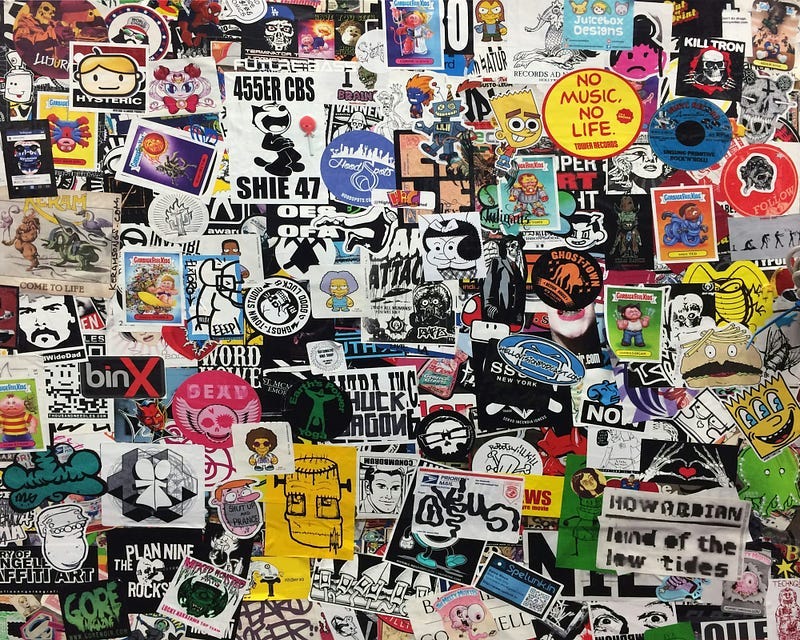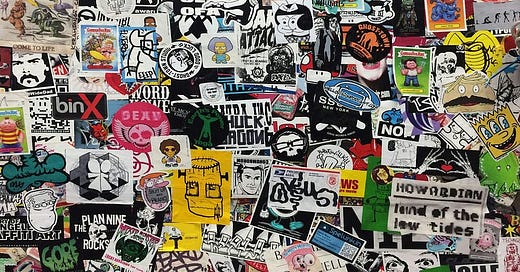Why are We Obsessed with Individual Identity and Labels?
Writing this article is so “on brand” for me

My phone dings: “I’m hanging out with my normie friends tonight…” one of my sober friends texts. My first thought is, oh they mean non-alcoholics. My second thought is, who the hell is normal? Since I’m on my phone now, I open Instagram. Suggestions to follow some Cottagecore page pops up, followed by a video talking about Tradwives. On my stories everyone is posting their Spotify daily playlist, and what the title says about them.
I need to get out of the house.
I walk down the street and see a couple of goths heading into a local cafe. I end up in a nearby thrift store, looking for something western to wear to “Gay Line-Dancing Night” at a local bar (yup, that’s a thing). I see a hilarious taxidermy duck and think of my friend who will be there tonight and I think… this is so on brand for him.
Everywhere I go, everything I do, I am surrounded by individual identity and branding. It has always felt like this hyper-individual society I grew up in was trying to overcompensate for something. As if we are fragments of full selves, fabricating our existence piecemeal with labels and subcultures. Why are we so obsessed with individual identities and labels?
While we can certainly point to consumerism and capitalism in many aspects, I would argue that in a connected way but on a deeper level, it is about a loss of sacredness and cultural/ancestral roots.
We are no longer communities, we are commodities. And we behave like it.
The Loss of Religious and Other Community Spaces
I’ve had my many identity phases of my own. A goth phase, a hippie raver era, a few years as a Buddhist, and a time where my queerness embodied most of my existence. Despite these very clearly defined eras in my life, one thing has underpinned it all: a search for belonging and meaning. Something that self-branding can never give me.
When we left our churches and other religious institutions en masse, we did not replace the social functions that these spaces held. Untethered to what served as a social and cultural home, as much as a spiritual one, we found ourselves at the mercy of modernity: capitalism, individualism, rationalism, and consumerism.
Modernity, especially in a secular capitalist system, thrives on putting parts of ourselves into boxes and compartmentalizing life until we are broken segments of a whole person.
Leave your personal life at home, jobs tell us. Children belong in school, adults belong at work, seniors belong in homes. An Instagram account for your personal life, another curated one for your public “branded self” or influencing. Clothing aesthetics for vacations, seasons and “eras.” A named diet for your lifestyle. A label for everything.
In the search for identity, we have lost our deeper selves. And we have lost our deeper connection to community.
I was a university interfaith program facilitator and chaplain (aka a chaplain for students of any faith) for nearly five years. A theme that I noticed over years of working with students, not only teenagers but also adults all the way into their fifties, was a type of loneliness. Not just a social loneliness, but a loneliness within the self. I also noticed this was more of a common thread mostly among students from North America and Western Europe.
Unrooted: Ancestry Tests and Capitalist Culture
There was a deep sense of un-rootedness amongst many of the students I worked with. I mirrored that sense of longing, as a person who grew up Canadian with a variety of ancestral roots. Those of us born in Canada grew up in a ‘diverse’ (yet colonially white and mostly English-speaking) modern nation. Anyone who is not indigenous to these lands came from colonizer, settler, slave, immigrant and/or refugee roots.
In my own roots, my father immigrated from the UK (Welsh, English, and Scottish ancestry). My mother is from Cape Breton; with roots including the French Acadians who settled in Canada in the late 1600s, the indigenous Mi’kmaq population, as well as Scottish, Swedish, Polish and Italian immigrants throughout the past two centuries (that’s a lot of culture)!
Despite this mix of backgrounds, my ‘culture’ growing up felt distinctly Celtic/English. Such is the prominence of these cultures in a province whose latin name literally translates to “New Scotland.”
Not only was there a sense of being “Celtic, but also — “ in my cultural and ancestral identity, there was the growing up without a specific spiritual or religious influence. Like many other Canadians born in the past fifty years, I grew up distanced from the faiths of my ancestors. I was not baptized or raised in any religion, which also adds another dimension of longing.
As existential anxiety set in during my teenage years, I found myself with questions nobody could answer. I also felt disconnected from my ancestral roots, beyond bagpipes and a full English breakfast.
I believe that in place of those, I sought identity in typically modern ways. I tried on several identities as a teen, largely through expressing myself in clothing, music and hobbies. I spent years trying to understand who I was and how I fit in to this world, but nothing left me feeling rooted.
All of these identities were transient.
If my chosen identity could be removed as easily as removing layers of clothing to reveal my bare body beneath, then who truly lay beneath? I wondered how many other people were secretly asking themselves the same question. Perhaps they had never even explored the option that they were truly seeking something beneath all of the other layers they wore.
Assimilating to Consumer Culture
As I met more students in my chaplaincy work, I found this longing everywhere. Students came to me all of the time wanting to explore their spirituality, but having been raised with only negative connotations of religion (and sometimes also spirituality) they had no idea where to begin. At times I felt like a sacred travel guide, opening them up to possibilities of things they might like to explore.
There is a collective and intergenerational harm that has been done by religion, there is no denying that. But in our search to disentangle from the traumas of both our historical cultures and faiths, we have failed to replace the most important aspects of them.
Instead of finding new sacred places to hold community and rites of passage, we have sought answers in individuality and consumerism. Our isolation has been mass-produced and fed upon by a consumer-based culture that has taken our roots and sold them back to us in individual identity. It thrives on our assimilation into a broader, generic American or Canadian identity.
In place of feeling connected to our varying roots, we are obsessed with ‘core aesthetics’ and curated lives online. We buy our spirituality from gurus who regurgitate traditional wisdom without the trappings of historical religious institutions.
In a way, this loss of wholeness feels like an intentional repression. If we are lost and isolated, convinced that only individuality and labels can reveal the true us, we will remain as we are in a sick society that thrives on that very isolation.
Reconnecting with our Deeper Selves
We still have a tribal need to feel seen, heard and validated. I often find myself wondering how we can return to wholeness taking the lessons and wisdom of the past within our modern context.
Can we cultivate new intentional communities?
Can we invest in both our modern culture and our roots to create more wholistic lives?
Can we return to sacredness, even without religion, in a way that honours our wholeness and not just systems of capitalism and individualism?
We have never had more knowledge of our world, and yet, we have never felt so lost.
For me, finding wholeness has been a question of exploring my ancestral roots and rites, combining them with what it means to be a Canadian today. Like many Canadians of mostly settler/colonizer roots, I have struggled with what it means to exist in a nation built on the oppression and destruction of indigenous communities. I know that many of the students I worked with lived with a sense of ancestral guilt, which only added to a desire to know where they belonged and how they fit in to an invented culture.
Is it any wonder that we are obsessed with individual identity and branding when we seek to run from the horrors perpetrated by our own ancestors?
Perhaps the answer lies somewhere in the middle. I have grown beyond looking for subcultures and aesthetics that mark my identity. Instead I seek the deeper things that make me feel whole. Investing in my local community through volunteering, reading about Celtic spirituality to feel nourished by the wisdom of my Gaelic-speaking ancestors, asking how I can make where I live a better and more accommodating place for all current inhabitants, and creating or rediscovering meaningful rituals that ground me in a hectic world.
Perhaps when we consider identity we can tackle it like Kintsugi — the ancient Japanese practice of restoring broken pottery with gold. Overcoming isolation, loneliness, and lack of meaning might just be found by taking the big parts of ourselves and our past, and piecing them together with the golden promise of a more deeply connected and sacred future. It doesn’t require religion or a belief in divinity, only that we begin to return to seeing the world and ourselves as sacred, interconnected, and always evolving.
If would like to support me, you can buy me a coffee! Find my work on Medium here.



